CPR Skills that can Save Your Baby's Life when Choking with Brandon Doersken
- How online CPR can give you the confidence that you'll know what to do in the event your baby does have a choking incident.
- Which household items we all have laying around that are actually a big choking risk and we don't even realize it.
- Why taking an online infant CPR course + First Aid + choking prevention can help you be prepared for starting solids and what you can expect when you're there!
- The code KATIE10 works for $10 off all of these online courses. That is my affiliate discount code and these are affiliate links:
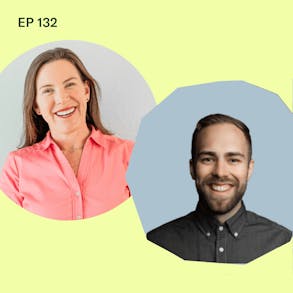
LISTEN TO THIS EPISODE
What can you do to get ready for starting solid foods before your baby is ready? Take an infant refresher CPR course. Getting your infant CPR skills up to snuff is incredibly important when preparing to start solid foods and baby-led weaning. Choking is a very rare - but real - risk, and knowing CPR can save your baby’s life.
In this episode I’m interviewing Brandon Doersken, who along with his wife Caitlyn run an online CPR training institute. I’ve been a huge fan of their courses since COVID forced all learning online and having CPR skills gives you the confidence that you’ll know what to do if your baby does choke on food when starting solid foods.
If you’re just getting ready to start solid foods and you have not (yet) taken a refresher infant CPR course, come check out some of the benefits along with ideas on how to implement the safety information you’ll use when you also begin baby-led weaning with your baby.
SHOW NOTES
SUMMARY of episode
In this episode I’m joined by Brandon Doersken who along with his wife Caitlyn run an online CPR course training institute.
In our interview Brandon is discussing:
How online CPR can give you the confidence that you’ll know what to do in the event your baby does have a choking incident.
Which household items we all have laying around that are actually a big choking risk and we don’t even realize it.
Why taking an online infant CPR course + First Aid + choking prevention can help you be prepared for starting solids and what you can expect when you’re there!
LINKS from episode
The code KATIE10 works for $10 off all of these online courses. That is my affiliate discount code and these are affiliate links:
TRANSCRIPT of episode
WANT MORE BLW INFO?!
SUBSCRIBE to the Baby-Led Weaning Made Easy Podcast - new episodes are released on Monday and Thursday and subscribing means you’ll never miss what’s new (+ you’ll get notified about special bonus episodes too!)
FOLLOW Katie’s baby-led weaning Instagram page @babyledweanteam for daily video trainings - lots of great info on interpreting your baby’s feeding behaviors here too!
SIGN UP for Katie’s free online workshop “BABY-LED WEANING FOR BEGINNERS: How to get your baby to try 100 foods before turning 1 without you having to spoon-feed purees or buy pouches” - everyone on the free workshop gets a copy of the 100 FIRST FOODS LIST so you can focus on trying new foods that your baby CAN and WANTS to self-feed (...and what they can drink too!) Sign up for this week’s workshop times here.

Latest Episodes
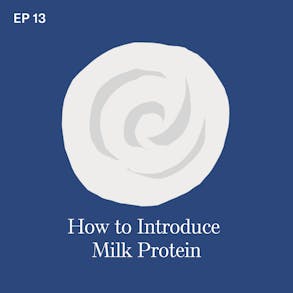
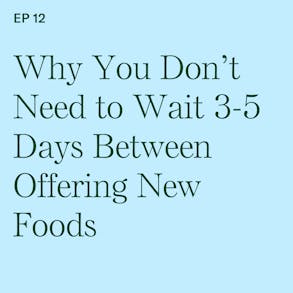
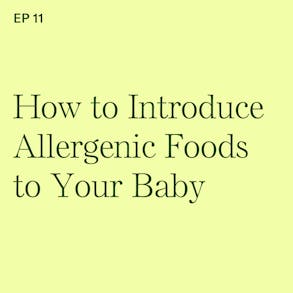
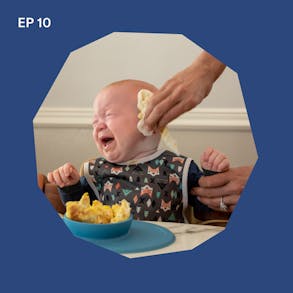
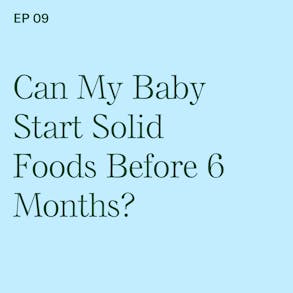
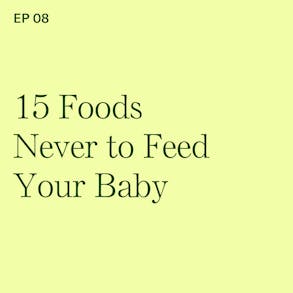
Brandon Doersken (0s):
We want to be around our kids while they're feeding, they need to be in the proper position feeding and you can reduce so many risks of actually your kid having a severe choking obstruction. And if they were to have it, you need to be right there to take action appropriately.
Katie Ferraro (12s):
Hey there, I'm Katie Ferraro, Registered Dietitian, college nutrition professor, and mama of seven specializing in baby led weaning. Here on the Baby-Led Weaning Made Easy podcast I help you strip out all of the noise and nonsense about feeding, leaving you with the competence and knowledge you need to give your baby a safe start to solid foods using baby led weaning. Welcome back today. We're talking about CPR and how knowing basic CPR skills can save your infant's life in a chocking incident. Now I know the fear of choking is a very rare but real risk.
Katie Ferraro (53s):
And as a baby led weaning expert and advocate, I do like to remind parents that the research demonstrates that babies who start solid foods with a baby led approach are at no higher risk of choking than our infants who do traditional spoon-feeding. But there's a caveat there that whole no higher risk of choking with baby led weaning stuff. It's only true when parents are educated about reducing choking risk. So I spend a lot of time in my content helping parents and caregivers learn how to safely prepare and offer foods for babies at the different stages of infancy, what foods and what feeding practices to avoid in order to reduce choking risks. But there's no replacement for knowing CPR and knowing what to do to intervene if, and when your baby actually does choke.
Katie Ferraro (1m 36s):
My guest today is Brandon Doersken, who, along with his place, Caitlyn run an online CPR training business. They offer online CPR and first aid courses for parents, caregivers and healthcare professionals. Now I've always personally taken in-person quarterly CPR class for my work in infant feeding and cause I work with babies, but it's also helpful in my real life. As I have seven small kids at home and I used to, I hated this, but I had to have to get two babysitters to go to my local hospital so that they would watch my kids. And I would go to the hospital. I would do my CPR, but during COVID I switched to an online model. That's when I met Brandon and Caitlin and I was so impressed with their online CPR courses and their first aid courses that I wanted them to come on and convince you that this is something you should definitely be doing before your baby starts solid foods.
Katie Ferraro (2m 20s):
And if you just started solid foods, you should take an infant CPR course ASAP so that you know what to do. If your baby does have a choking incident and also worked with Brandon and Caitlin, I'm actually developing a choking prevention course with them. This is brand new it's co-taught by me, swallowing expert, Dawn Winkleman, and then Brandon. And Caitlin's amazing certified staff members. Brandon will tell you more about that. But again, I just can't stress enough how important it is to take infant CPR before you start solid foods in my house, anyone who's going to be involved in feeding my baby also needs to be CPR certified. So the online courses that Brandon and Caitlin's family business runs super affordable. The CPR course, I think is $35. If you use my code 10, you can get an additional 10% off.
Katie Ferraro (3m 1s):
So it brings the cost of $25. So I am an affiliate for them. That is my affiliate discount code. And I'll go ahead and link to the CPR course on the show notes page for this episode that you can find at blwpodcast.com forward slash one three two. So with no further ado, let's talk a little bit more about why CPR skills are so essential for parents and caregivers before starting solid foods. And this is an interview with Brandon Doersken of thrive training Institute. Well, hi Brandon. Thank you so much for joining me today.
Brandon Doersken (3m 31s):
Oh man. It's awesome to be on the show. Love what you do.
Katie Ferraro (3m 34s):
Love what you do. I know we talk a lot for like work stuff, but this is cool. It's the first time I've actually had you on the podcast talking about CPR. Tell us a little bit about your business and what you guys do with CPR.
Brandon Doersken (3m 44s):
I have a four-year-old and a two-year-old and we care so much about families. And about a year ago, we were just like, we were in a crossroads for our own family. And as we were looking at what we could do to help others, as we all know COVID-19 happened to the world, and this really came at an opportune time where we had been hearing about families wanting to get CPR skills and with COVID, everybody was inside and we figured out a way that we could get these skills to people online, which it's already hard enough. I mean, you have a couple of kids, you know, you know what it's like to get out of that house?
Katie Ferraro (4m 15s):
No, I just have to get a babysitter to go to my CPR class. And one time I went all the way down to the hospital and the CPR instructor didn't show. And I was living because I was like, do I actually have to get two babysitters to leave the house? Like I was pretty mad about
Brandon Doersken (4m 25s):
It. Yeah. You got to get two, again, you need two babysitters. And so for us, when we saw this, that parents actually want these life-saving skills, they want to know what to do in these emergency situations, which we'll, we'll talk a little bit more about in this episode, but most parents, even though it's a priority, it's not that high of a priority. If it's not for their job to get a babysitter and leave the house for a few hours. And so we wanted to come in and create an opportunity for parents to be able to go through a CPR training and get that, that base knowledge so that they can know what to do and increase that level of confidence. Because all of us, when we, when your spouse gives birth or you have a, you adopt or whatever, however, you became a parent, you get thrown into the deep end and it's like, how do we figure this thing out?
Brandon Doersken (5m 5s):
And so this is like the biggest question. How do I keep my kid alive in an emergency? And for us, it's been an honor to try to answer that question.
Katie Ferraro (5m 13s):
One thing my audience is always confused about is like, okay, what are the things I can do to get ready before my baby starts solid foods? Cause they all want to start early. I'm like, no, you cannot start early. You got to wait till your baby's six months of age, plus showing the other signs of readiness to feed, but on the like checklist of things to do. And even actually we have a podcast episode, five things you should be able to do before your baby starts solid foods. And on that list is take our refresher infant CPR course. Cause I know as a new parent, you know, you in pre COVID times, you go to the hospital and you do a breastfeeding class there, you would do the hospital tour and you would do infant CPR. And then six months later when the baby's ready to start solid foods, like I can't even remember what I had for breakfast that day, let alone CPR skills from six months ago. So I always encourage parents to take our refresher CPR course before their baby starts solid foods, especially because what you were paying attention to for those first few days and weeks of life, like what you were freaked out about when, before your baby was born is totally different than what you're freaked out about when your baby turns six months of age.
Katie Ferraro (6m 7s):
So I was wondering if you could talk about a little bit about how important CPR is when you're starting solid foods at around the six month mark.
Brandon Doersken (6m 15s):
I think it's huge because most things in parenting, I want to even speak to like how fast-paced our lives are today. And so parents feel this pressure, like you said, you're having to encourage parents. Let's wait until we're even seeing signs that kids are ready to feed. And so when, when it comes to these developmental phases for child development, we want parents to be equipped. And so when you're getting ready to introduce solids, most people have this fear. What if my kid chokes or what if an emergency happens and I don't know what to do. And so we would put CPR really high up on the list. There is something you should know the basics. You should know what to do. The difference between, I know you talk a lot about this gagging and choking. We might go into that a little bit more on the show, but we want to know what to do.
Brandon Doersken (6m 56s):
If there is a severe airway obstruction and CPR, if you're able to attend an in-person training, that's phenomenal. But if you're not, we highly encourage an online resource like the one we've developed so that it's just right up there at the top, like prevent yourself from knowing that knowledge, if it's readily available to you. So that's, that's really our heart.
Katie Ferraro (7m 13s):
Agree with you. And I think that the fear of choking is certainly the biggest barrier to starting solids. Regardless if you're doing a baby led approach or traditional spoonfeeding. And I do remind parents that putting anything in your baby's mouth, including a spoon can be a choking hazard. Like the risk of choking is very rare, but it is very real. And so having CPR skills will give you the confidence that you know what to do. If your baby does have a choking incident. And we do a lot of education around reducing choking risk, but the risk is still there. Does that mean we're going to refrain from starting solid foods with our babies? No. They need to learn how to eat. They need to learn how to handle different textures. They're very unlikely to choke, but if they do, you should have those basic CPR skills. So tell our audience, if you can, like how does an online CPR coursework?
Katie Ferraro (7m 56s):
I mean, I know because I take your course, literally almost every other month at this point, just to refresh and I used to take it every quarter in person pre COVID, but then I got introduced to you guys and to be honest, like I think the online option is so convenient and I was amazed how much you can learn online. Cause I was like, no, you got to have hands on for CPR, but you really don't. You guys have done such a great job in your course. What can parents expect when they go to take an online CPR course?
Brandon Doersken (8m 17s):
Well, I appreciate the positive feedback there. What people can expect. It's a prerecorded training. So that means that if your schedule is crazy and you only got 30 minutes here or, or you only have a certain window, once the kids go to sleep, you're not out of luck. It's not like you miss the training. And so it's prerecorded. So you can watch the videos as many times as you want. I know there's certain people that they want to see at one time they're done there's those people that want to take their own notes. So there's videos that you can go through and then there's text below it that affirms what you're already learning. So you get the visual than the written. And then there's little quizzes to make sure that you're retaining that information as well as a downloadable book that you can keep to reference on the go. And so you're probably not going to go reference a CPR training when an emergency is happening, but you can review it when things are calm.
Brandon Doersken (8m 59s):
And so that's what people can expect it. You can actually go through it and under an hour and then go through it. Like you said, you're going through it. You know, every other month, just to stay fresh, you have access to it to continue to go through it. So it's not like a one and done, it's a prerecorded that you can go through it at your own pace. As many times as you deem necessary
Katie Ferraro (9m 16s):
Have been in a position with lots of kids, starting solid foods at one time. So quadruplets and then a year and a half later twins. And so I always have a babysitter or someone there helping me, especially watching the other kids when the baby is learning how to eat. And I always ask my caregivers, not ask them. I require my caregivers to have basic CPR training when they're going to be engaged in either a watching my kids and certainly be feeding my kids. And so I've used your courses as a really affordable resource. That was another thing it's like, I think your courses are appropriately priced, but they're incredibly affordable for what you get and to have it in the convenience of your own home, I make my sitters and caregivers do it as well.
Brandon Doersken (9m 53s):
Yeah. We've had a lot of feedback of people. Like I want to get this for my, for my babysitter, for my nanny. And so that's been a big use for the parents that come through the courses. They're like, well, I want to get this from my babysitter as well. Cause I want them to have it. And actually grandparents as well, I get a lot. I exchange emails sometimes with grandparents, you know, figuring out their logins and everything. And so grandparents are using us as a resource, but like I won't be seeing my kids for a few months, but my, my daughter, son, they sent me this. I need to go through it before I hang out with my grandkids. So I think it's a great resource and not a burden to give to people. But Hey, I'd love for you to go through this before watching my kids.
Katie Ferraro (10m 24s):
It's not passive aggressive. Like I have grandparents by my baby led weaning horses all the time. Like, well, either a, my daughter or daughter-in-law told me I got to do this and I don't know how to do it, or I want to get these skills. And there's a really cool online resource to help me do that. So I've been an affiliate for your CPR courses for a while now, I, I only began, I don't have to do affiliate work for very many companies, just brands that I actually use in my own household and in my own professional life. So I strongly recommend your programs. I also appreciate that you discount the program even further. So I actually have a discount code and I'll link to that to get $10 off the program for the online course. And you can check that out on the show notes for this episode@blwpodcast.com. If you are interested in taking an online CPR course before your baby starts solid foods,
Brandon Doersken (11m 8s):
One of the things that can not replace self-education is being attentive. I want to reiterate that like, it's not, you don't just take this course and then stop paying attention to your kids. I know for you. And what you help parents do is we want to be around our kids while they're feeding. And if they're not, they need to be in the proper position feeding and you can reduce so many risks of actually your kid having a severe choking obstruction. And if they were to have it, you need to be right there to take action appropriately, but you can't replace. You can't just turn on the TV. And now, because you took the course, you still need to be present when your kids are feeding, which I know is what you encourage to your audience.
Katie Ferraro (11m 42s):
So Brandon, we all know as parents of children, that babies tend to put things that they find into their mouths as they start to explore, especially as they start to crawl, which for most of you will be the next stage. After you start solid foods from your experience, what are some of the most common choking hazards that can be found in homes for babies?
Brandon Doersken (11m 59s):
That's a great question. And there's a lot of things that you want to think about things that are cylindrical, they're circular and they're small. And so if it can fit into a toilet paper roll, which you guys were all familiar with, then it's small enough that the baby could put it in their mouth and, and have a choking issue with that. And so I know we aren't using paper money as much, but coins, paper clips, batteries are a big one because we have them laying around sometimes in drawers that are easily accessible. And so one thing that can be really good to do is if your kid's now crawling around and they're putting things in their mouth is you need to crawl around your home and see what things are accessible when they can start coming up and climbing up and opening drawers. We don't want the circular button shaped batteries for watches. Those are easy to slide down.
Brandon Doersken (12m 40s):
And those actually, because batteries have different chemicals in them that can also cause other complications. And so you really want to think through what things are circular buttons, a lot of birthday parties, we have, you know, you got balloons. You want to make sure balloons, they get popped that the elastic stretchy stuff gets thrown away. That looks like a, maybe a pacifier, something to chew on. So we want to get those balloons taken care of anything, circular that you can picture marbles. And then this is one that's super common because of older kids. You know, you might have a five or six year old in the home that they know what to do with small objects, but they need to make a, to make sure that they're picking up or that their chockable toys stay in their room or outside of the same room where your eight month old that's crawling around is, is located.
Brandon Doersken (13m 20s):
Those are just some of the basics. But those things, if we look around, you think like, oh, that's, I could put that in my mouth and choke on that. You know, your kid, you want to really take action on those things. So basically, I mean, not everything.
Katie Ferraro (13m 33s):
And when you look at the data for a nonfatal, pediatric choking incident and admission to the emergency department, you know, we always see the same foods at the top of the list, right? Hotdogs, cutting coin, shape, popcorn, nuts seeds, larger seeds. That is candy. And then the parents like roll their eyes like candy, who gives the baby candy? I know you mom are not giving the baby candy. It's the other kid in the house or another kid who comes into the house or the baby's crawling around on the floor and finds it. It's not the actual parent feeding it. We just need to be vigilant, which sometimes when your baby gets more proficient at self-feeding, you're like, oh, they got this and you stop paying attention as much. And that's where the risk comes in. And knowing CPR is so important and having refresher CPR course is so important.
Katie Ferraro (14m 13s):
And tell us a little bit about the courses that you guys have. If I understand correctly, there's one access that's lifetime access, is that correct?
Brandon Doersken (14m 21s):
Yeah. So we have a, we actually have CPR and then we have a basic first aid course, giving parents some of those, some of those tools to know what to do in certain situations. First aid situations. What we're doing is we're bundling those and parents can actually have an opportunity to gift one of those courses at, from times we run different promotions so that you can have lifetime access and gift it to a, to a babysitter or a, a grandparent. But we're actually working on a course here, familiar with this. We're working on a course on the choking prevention side, because like, we're talking about so much of this. There's not like fear of how is my kids gonna, you know, something's just going to appear in mouth. We want to prevent, we want to create safe spaces for our kids. And we want to feed our kids properly. We want to pick up around properly. So here at thrive, we actually, aren't trying to position ourselves as the experts.
Brandon Doersken (15m 1s):
We're trying to work with other experts, such as yourself to produce incredible resources for people to know what to do. So we're working on a choking prevention course, with you right now, we're hoping to get that launched so soon and that's really gonna help people have that confidence of, well, is this going to happen? It's like, well, we're going to, we're going to give you all these reasons on all of these ways on how you can prevent this from happening. But if it does, the course does talk about what to do in the case of an emergency. And it was
Katie Ferraro (15m 27s):
Really fun working on, I mean, as fun as choking can be, was really fun working with you guys on that program because you already have the whole infrastructure set up. So you have in all of their courses, they have the certified trained expert. Who's teaching the intervention side. And then my friend and colleague Dawn Winklemann, and I she's a speech language pathologist who specializes in pediatrics. We did the whole prevention side. So how to reduce the risk for choking. Because when we look at the data, especially for baby led weaning, we know that babies who start solids with a baby led approach are at no higher risk of choking than our children who start with traditional. Spoon-feeding provided that the parents are educated about choking risk and that's this huge asterix that's like, will parents say, what do I do to reduce choking risk here, take this choking prevention course in a very short period of time, you'll get up to speed on and you'll be surprised.
Katie Ferraro (16m 13s):
There's a lot of stuff. A lot of parents are doing. It actually increases choking risk. And it's a few simple tweaks and fixes to know about before you start solid foods, or if you already started, you can make that switch to make it a safer experience for your baby to reduce choking risks. Which of course in turn increases the likelihood of success with independent feeding, just having the first aid course. I feel like I know the basics of what to do. And for me it's like, when do I go to urgent care slash the ER, and when can I take care of this at home? That was one thing that you're a first aid course really helped me with. And it was so comprehensive, really impressive. I mean, I recommend the first aid course bundled with the CPR class. And again that the discount code Katie 10 works for $10 off the bundles as well. And I'll link to that for you guys on the show notes for this episode at blwpodcast.com.
Katie Ferraro (16m 57s):
Okay. Brandon, before we go, I have to ask you guys one thing I, so so-so like enamored with you and your wife. I mean, you're nice, but your wife is amazing and I like love that you guys can work together. Cause I can't even pay the bills with my husband. Like we just don't work well, like in a work work capacity, we work, I think okay. As a parenting at couple capacity, but you and Katelyn like run a business together. Tell me a little bit about how that, how that goes. How's it going?
Brandon Doersken (17m 21s):
Yeah. Well, I went on a deep healing journey this last year and a half to understand my emotions and the inside world. And so that is actually what propelled this business to become what it is is because it allows me to get feedback from my wife on my, I have all these big ideas. So I'm the big idea guy. And she's like, okay, we actually have to talk with people. We actually have to execute. So we, we really balance back and forth on I'm I'm up in the clouds a lot. And she's like, okay, this is how this gets done. And before I would've been like, are you questioning my big ideas? And now I'm just like, okay, tell me what needs to stick, tell me what we need to go. And then we keep moving forward. So we're a pretty dynamic team when we're willing to receive each other's feedback. And that has ultimately what's turned to thrive into what it is today is hearing from each other, taking each other's strengths and running with it.
Brandon Doersken (18m 4s):
But it definitely has its challenges, but some of the perks are we're we're able to be at home with our kids a lot. We're able to travel to see family and we're able to work together to do awesome projects like working with you.
Katie Ferraro (18m 13s):
I think it's really cool that you guys work together too. I know like the interview is supposed to be me and Caitlin. You're like, Hey, wait a babysitter to fall through. Like we switch off and on my husband and I do that as well. But like it makes things it's, it's, it's just so hard because you never feel like you're giving a hundred percent to your kids or to your work. I totally understand the struggle. And I really appreciate that you guys are doing this at such an affordable price point because I want CPR to be accessible to all parents. It shouldn't be a, well, I can't afford it, but I have to start solid foods. The price of your online CPR course is $35. And with the $10 off code, Katie 10 for $25, you can get your CPR skills up to snuff and potentially save your child's life. If there's a choking incident. And I also wanted to ask real quick too, because I have a lot of parents ask me, they have to get CPR for their work and they want to do it for infant feeding.
Katie Ferraro (19m 1s):
Do you offer certifications for people who may require that for work?
Brandon Doersken (19m 6s):
Absolutely. There's so many different requirements, depending on your work. If your work requires you to have a hands-on skills assessment, we would be what would be considered the knowledge learning portion of a certification. So just check with your employer first, if you end up going through the course, loving it, but your employer does not accept it for whatever reason we can get you a refund if you're getting it for certification purposes. But yes it does. It does provide the knowledge certification for CPR. And a lot of professions nowadays are actually allowing you to do that just online to get your, your skills in your mind up to date. But if you do need the hands-on skill assessment, you'll need to do that in person, but we can, we can do the knowledge portion
Katie Ferraro (19m 41s):
And your customer service is insane. I have referred so many parents over the years to your programs. I think one mom wrote to me and was like, they said it was certified and my work doesn't certify it. And Brandon, you personally worked with her and her employer to explain to them, yes, this is certified for whatever you guys need. And she wrote back to me and was like, thank you so much. Like, I really didn't expect that the owner of the business was going to help me deal directly with my employer. I know you can't do that for every employee cause you guys gotten really big, but I do just want to say like you have a great reputation as far as customer service goes and delivering a quality product.
Brandon Doersken (20m 10s):
Thank you. We want to treat everybody like family. We're serving families. And we got to got to treat everybody like family.
Katie Ferraro (20m 15s):
Brandon, thank you so much for joining me. It's been such a pleasure to talk to you and thanks for making CPR accessible and doable and like also short, like I was kind of dreading that I was going to take all day. The first time I took your course and it's you don't mince words is all I'll say.
Brandon Doersken (20m 27s):
Well, it's an honor to be on the show and thank you so much for all the positive feedback and love and for sending so much of your audience to come take a look at what we're doing, we feel honored to partner with you and love what you're doing and are excited for all of our projects together in the future.
Katie Ferraro (20m 41s):
Well, I hope you guys enjoyed that interview with Brandon. He's one of my favorite people. I wish his wife Caitlin could have come. She's so lovely as well, but they are doing such an amazing job to make infant refreshers CPR courses, engaging, entertaining. They're incredibly informational and also affordable and attainable. So if you want to check out their online CPR course, it's normally $35. The code Katie10 works for $10 off. So bringing the cost of that online CPR course down to $25, I'll link to the exact place where you need to go to get that on the show notes page for this episode, which you can find at blwpodcast.com/123. Thanks so much for listening and I'll see you guys next time!

The Program Baby-Led Weaning with Katie Ferraro
A step-by-step digital program for starting solid foods safely and navigating the original 100 FIRST FOODS™ meal plan with baby-led weaning.
 EXPERT-LED, PROVEN APPROACH TO EATING REAL FOOD
EXPERT-LED, PROVEN APPROACH TO EATING REAL FOOD CONCISE VIDEO TRAININGS TO MASTER BABY-LED WEANING
CONCISE VIDEO TRAININGS TO MASTER BABY-LED WEANING 100 FIRST FOODS DAILY MEAL PLAN WITH FOOD PREP VIDEOS
100 FIRST FOODS DAILY MEAL PLAN WITH FOOD PREP VIDEOS
Baby-Led Weaning for Beginners Free Workshop
Is your baby ready to start solid foods, but you’re not sure what to do? Register for this free online video workshop and learn how to give your baby a safe start to solid foods using baby-led weaning. Everyone on this free training receives a copy of Katie’s original 100 FIRST FOODS™ list. You can take this workshop right now, later today when your baby naps, or tomorrow…whatever works for you!
Get baby-led weaning recipes and tips delivered to your email inbox.